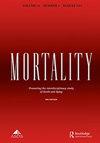Trans death at Rikers Island: sites of (in)visibility and reframing mass incarceration
IF 1
0 HUMANITIES, MULTIDISCIPLINARY
引用次数: 0
Abstract
ABSTRACT On June 7th, 2019, Layleen Xtravaganza Cubilette-Polanco, a transgender woman from New York, died at Rikers Island while in solitary confinement. According to officials from the Department of Corrections, Layleen’s death was a result of a series of interrelated health problems. . Trans, queer, and gender non-conforming people, especially youth of colour and Black trans women, face heightened rates of homelessness, violent victimisation, barriers to housing, employment, and healthcare. These social conditions are tied to heightened engagement in survival sex work, over-policing, and surveillance of their communities. As a result, Trans and queer people are disproportionately impacted by mass incarceration, and must contend with the nexus of a system that functions on racist and colonial legal construction of gender, making carceral spaces sites of (in)visibility and death. The death of Trans people within these carceral spaces are followed by multiple discursive deaths, including the use of dead names in media, misgendering, and transphobic political debate. This paper aims to highlight and explore carceral settings as sites of death and (in)visbility for Trans and queer people and how reframing allows us to identify how (neo)liberal reforms meant to protect Trans people only entrench mass incarceration in the United States.赖克斯岛的跨性别死亡:引人注目的地点和重新定义的大规模监禁
摘要2019年6月7日,来自纽约的跨性别女性Layleen Xtravaganza Cubilette Polanco在里克斯岛被单独监禁期间死亡。据惩教部官员称,Layleen的死亡是一系列相互关联的健康问题造成的。跨性别、酷儿和性别不合的人,尤其是有色人种青年和黑人跨性别女性,面临着更高的无家可归率、暴力受害率、住房、就业和医疗障碍。这些社会条件与加强对生存性工作的参与、过度监管和对社区的监督有关。因此,跨性别者和酷儿受到大规模监禁的不成比例的影响,他们必须与一个基于种族主义和殖民主义性别法律构建的系统的联系作斗争,使尸体空间成为引人注目和死亡的场所。跨性别者在这些尸体空间内死亡后,又发生了多起随意的死亡事件,包括在媒体中使用死者的名字、误导和恐跨性别的政治辩论。本文旨在强调和探索作为跨性别者和酷儿死亡和可观察场所的尸体环境,以及重新构建如何使我们能够确定旨在保护跨性别者的(新)自由主义改革如何只会在美国巩固大规模监禁。
本文章由计算机程序翻译,如有差异,请以英文原文为准。
求助全文
约1分钟内获得全文
求助全文
来源期刊

Mortality
Arts and Humanities-Religious Studies
CiteScore
1.80
自引率
12.50%
发文量
42
期刊介绍:
A foremost international, interdisciplinary journal that has relevance both for academics and professionals concerned with human mortality. Mortality is essential reading for those in the field of death studies and in a range of disciplines, including anthropology, art, classics, history, literature, medicine, music, socio-legal studies, social policy, sociology, philosophy, psychology and religious studies. The journal is also of special interest and relevance for those professionally or voluntarily engaged in the health and caring professions, in bereavement counselling, the funeral industries, and in central and local government.
 求助内容:
求助内容: 应助结果提醒方式:
应助结果提醒方式:


